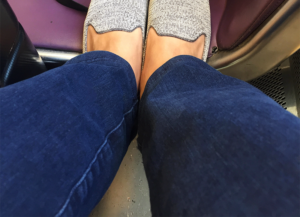
Carl is working two jobs that each pay $12 per hour. He has $5,000 in student loans. What can he do to improve his situation?
Caroline is about to finish paying off her student loans, and in the next few years she wants to buy a home. Where should she park her savings in the meantime?
Philip is saving for financial independence, but he’s not sure what to do with his time once he quits his job. How can he discover what ignites him?
Amanda is receiving an inheritance, a New York City 4-plex valued at $500,000. How should she handle this?
And an anonymous caller wants to know what the step-by-step path to wealth building would look like.
I answered all of his questions in today’s episode, plus I feature a short follow-up interview with Kim, the firefighter whom we met in Episode 139.
Enjoy!
Here are more details:
Anonymous asks:
If you had to break down wealth building into 7 easy steps (similar to the Ramsey baby steps), what would it look like?
Carl asks:
I’m 25 and working two jobs that I don’t really like (mainly because of how physical they are): one is part-time, the other is full-time, and I make a little over $12/hour at each.
I have a $1,000 emergency fund and I’m almost done paying off my credit card, but I still have about $5,000 left in student loan debt for a technical college that didn’t work out.
It’s hard to find jobs in my area that pay as well as what I’m making now without any special skills, and I’m nervous about going back to school. I have a passion for personal finance and even blog about it, but I’m not really sure what to do. Can you help?
Russell asks:
I’m moving out of where I was living and I have two options for where I can go next:
Rent a place by myself
Take out a loan and get an RV and live really far out of town with my parents
My end goal is buying a home in Sonoma County, California within the next five years. Although prices are outrageous, I have a landscaping business there which is doing well.
Is it worth it to be uncomfortable living in a far-away trailer for two or three years? Or is it more worthwhile to keep saving and to try and rent out a place that’s below market value ($1,100 – $1,300). What’s the most efficient option?
Phillip asks:
I’m a 29-year old homeowner, married, with no plans to have children. We plan to reach financial independence on W2 employment – we don’t have any interest in starting a business or building a rental empire.
My problem is I have no idea what I’m going to do when we reach financial independence. During the week, we keep busy at work or at the gym, but when we finish chores on the weekend, we default to watching Netflix or reading. We travel a few times a year, but it’s typically either to a new city to sightsee and try local foods and drink, or to a beach location where we can sit under an umbrella and have cocktails delivered to us as we read.
FIRE, as I see it, is exclusively to eliminate the pain of giving my time to an employer, but I don’t know what I would do with my time if it was my own. What exercises or resources would you recommend to help me figure this out?
Caroline asks:
I’m 29 and my husband and I work full-time, but we’ve spent the last four years getting out of college debt. We’re nearly there – the only single debt we have is about $6,000 on a student loan, but that will be paid off in the next month or two. Other than that, we’re debt-free, no car loan or credit card debt. We have about $30,000 in the bank which doesn’t include our 401(k)s.
However, most of that will go towards purchasing a home in the next couple of years. My question is: do we keep all of that liquid cash in a basic savings account, this way it’s easy to access for the downpayment? Or do we stash some of it into an emergency fund and put the rest into a different type of account that earns more interest and then pull it out when we actually want to buy the house?
Amanda asks:
My family has a house in New York City which I’ll eventually inherit. It’s a four-story, single-family townhouse with four independent apartments. The apartment I used to live in I now rent to a friend, and the rest are inhabited by my family.
The building is owned outright by my grandmother and valued at around $500,000. Similar buildings in the area have sold for at least $1 million. When I eventually inherit it, I plan on doing some renovations and then renting out the apartments.
However, next month, a discussion about registering the neighborhood as historic will take place.
My questions are:
- What is the best way to pass down the building to me?
- Will a historic registration affect how this is done?
I answer these six questions in today’s episode. If you have a question that you’d like answered on a future episode, you can leave it at affordanything.com/voicemail
Have a great weekend!
Resources Mentioned:
Thanks to our sponsors!
Gusto
Gusto makes payroll, benefits, and HR easy for modern small businesses. In fact, 72% of customers spend less than 5 minutes to run payroll! If you sign up at gusto.com/paula, you’ll receive 3 months free once you run your first payroll.
Blinkist
Busy, but love to read and learn? Blinkist is the only app that takes the best key takeaways from thousands of nonfiction books and condenses them down into just 15 minutes. You can start a free 7-day trial when you join at blinkist.com/paula.
BruMate
BruMate is shaking up the beverage industry for the better. Its insulated drinkware is designed to keep your favorite beverages ice-cold all day long. It’s perfect for bringing along to any outdoor event! Visit brumate.com and enter code “paula” for 15% off your first order!

I’m wearing my Betabrand pants on a flight – they’re that comfortable!
Betabrand
Most of us find ourselves in situations where we need to wear dress pants, whether it be for work, a conference, or a meeting. If only you could wear yoga pants to everything, right? Well…now you can! Betabrand actually offers dress pant yoga pants, and they’re as awesome as they sound. Check them out and get 20% off one pair by entering “paula” at checkout.